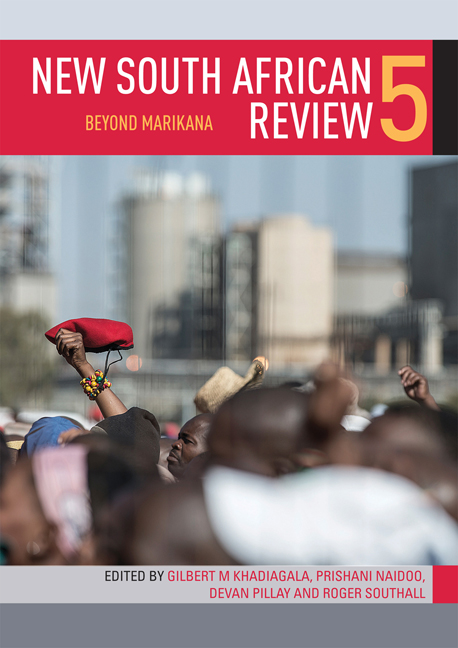Book contents
- Frontmatter
- Contents
- Preface
- Introduction: Political reconfigurations in the wake of Marikana
- PART 1 NEW POLITICAL DIRECTIONS?
- PART 2 ECONOMY, ECOLOGY AND LABOUR
- Introduction to Part 2
- Chapter 4 The South African economy: The minerals-energy-finance complex redubbed?
- Chapter 5 Between a rock and a hard place: State-business relations in the mining sector
- Chapter 6 The platinum belt strike wave: Breakdown in the institutionalisation of industrial conflict
- Chapter 7 When gold mining ends: An environmental catastrophe for Johannesburg?
- PART 3 STATE AND SOCIETY
- PART 4 SOUTH AFRICA IN THE INTERNATIONAL ARENA
- Contributors
- Index
Chapter 5 - Between a rock and a hard place: State-business relations in the mining sector
from PART 2 - ECONOMY, ECOLOGY AND LABOUR
Published online by Cambridge University Press: 21 April 2018
- Frontmatter
- Contents
- Preface
- Introduction: Political reconfigurations in the wake of Marikana
- PART 1 NEW POLITICAL DIRECTIONS?
- PART 2 ECONOMY, ECOLOGY AND LABOUR
- Introduction to Part 2
- Chapter 4 The South African economy: The minerals-energy-finance complex redubbed?
- Chapter 5 Between a rock and a hard place: State-business relations in the mining sector
- Chapter 6 The platinum belt strike wave: Breakdown in the institutionalisation of industrial conflict
- Chapter 7 When gold mining ends: An environmental catastrophe for Johannesburg?
- PART 3 STATE AND SOCIETY
- PART 4 SOUTH AFRICA IN THE INTERNATIONAL ARENA
- Contributors
- Index
Summary
INTRODUCTION
Between 2001 and 2008 (the longest sustained commodity boom in recent history) South Africa's mining industry contracted at a rate of 1 per cent per year whereas its closest competitors grew at an average rate of 5 per cent per year. Many explanations have been offered for this contraction but few have employed an overarching theoretical framework through which to understand it and its relationship, for instance, to slow, jobless growth in the broader economy (1.5 per cent GDP growth in 2014). The specific focus of this chapter on state-business relations is inspired by findings that ‘effective state-business relations … have an unambiguous positive effect on economic growth’ (Sen and Te Velde 2009: 1268-1269) and Scott Taylor's assertion that business-state coalitions are essential institutions of late capitalist development (2007: 3). Notions of a minerals-energy complex (MEC) have typically been used to explain South Africa's political economy dynamics as a ‘system of accumulation and the form taken by capitalism in determining economic and social outcomes directly in major part, and indirectly through its central location within the economy and upon which so much else depends’ (Fine 2008). But such a view does not adequately capture the dynamics of state-business relations for explaining poor growth outcomes. As Roger Southall points out in a comparative review of two books on the matter, ‘… given that … in the current era, capitalist development seems to be the only game in town, there is an increasingly urgent need for us to understand not just the economics of enterprise in Africa, but the way in which business is affected by and affects its social and political locale’ (Southall 2008: 223).
This chapter therefore offers an addition to the MEC explanation by arguing that the changing institutional dynamics of South Africa's elite bargain since 1990 explain the decline of the mining industry specifically and the lack of pro-poor growth more generally. The core argument is that the magnitude of private investment in the mining industry (and private investment more broadly) depends on credible commitment from the state that the rules of the game will remain largely stable over the lifetime of the investment. The South African reality is that minerals legislation and implementation has generated substantial uncertainty, undermining this commitment and slowing investment growth while enriching political insiders.
- Type
- Chapter
- Information
- New South African Review 5Beyond Marikana, pp. 86 - 103Publisher: Wits University PressPrint publication year: 2015



